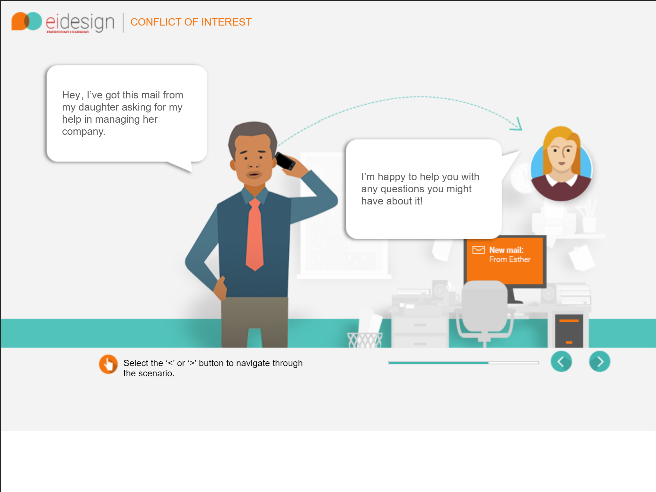
Compliance Training is one of the most challenging aspects of employee development. Despite their value, every employee dreads taking it. In this article, I demonstrate how Scenario Based Training can flip these mind-numbing courses around!
What Makes Compliance Trainings So Problematic?
Unlike other trainings that help learners perform better and motivate them to take them, this is not the case with Compliance Trainings.
There’s no mistaking the significance that compliance has in the workplace. Whether mandated by legislation, regulation, or policy, these trainings serve to educate employees on the applicable rules/laws pertaining to their job – Important, yes. Entertaining, NO.
Here are the Top 3 Problems that lead to a complete disconnect from the learner when it comes to Compliance Trainings:
- More often than not, the topic of Compliance tends to be boring, or worse – preachy. Shockingly, adult learners aren’t into it either.
- Learners are motivated by many things – gaining new knowledge, acquiring new skills, or becoming better at their job. Unlike the courses designed to meet these objectives, Compliance-based Trainings are “mandated” – read forced. This creates an immediate push-back from the learner and kills most of the intrinsic motivation to take them.
- Compliance Trainings typically follow a predictable flow. Facts > Policies > Punishment > Quiz > Repeat. This formulaic design leads to a complete lack of engagement.
However, the right strategy (including Scenario Based Training and its varied applications) will help organizations achieve the mandate, without losing the learner.
How Do We Fix Compliance Trainings with Scenario Based Training?
Typically, the compliance mandate is to achieve adherence to guidelines/processes or bring in a change in thinking (eventually resulting in behavioral change). Scenario Based Learning can be leveraged very successfully to influence this conformance and impact adjustments in thinking/behavior dramatically.
I share 4 strategies where different variants of Scenario Based Training make Compliance Trainings compelling. For each strategy, I have added tips and examples to illustrate how we achieved the required results (conformance, change in thinking, or behavioral change).
Strategy 1 – Scenario Based Training for Compliance Training
Scenario Based Trainings shift the learning experience from passive to immersive. By creating a story that the employee can interact with, you place them directly into the action. Stories – featuring relatable characters in situations similar to real-life are probably the best eLearning practice you can implement to make the online Compliance Training interesting.
Tip – Factor for the following:
- Details will keep your scenario appealing and your learner riveted.
- Emotion is a powerful tool to make the scenario both immersive and memorable.
- Attention grabbers like cliff-hangers and plot twists will keep your employee engaged.
- Relevance is essential for your employee to relate specifically to organizational issues.
Example 1: Conflict of Interest
Objective: To create an immersive learning experience on how to manage workplace conflicts effectively.
Highlights of the Approach
- Included scenarios as part of the story narrative with relatable cast and characters to provide a real-life learning experience.

- Provided content as videos and other interactive formats that were part of the narrative.

Impact: We triggered the behavioral change due to the simulated story narrative – featuring real-life and relatable instances.
Strategy 2 – Scenario Based Training for Compliance Training
Scenario Based Training, with real-world experiences incorporated, helps your audience mesh the virtual world with on-the-job applications. If our goal is the exact change in behavior, we must bridge the gap between the training experience and the on-the-job application.
Tip – Utilize scenarios that are realistic and super-focused on your learning objectives; the employee is much more likely to apply that knowledge successfully in their workplace if they see the relationship and understand the reasoning behind “why comply.”
Example 2: Combating Bribery in Business
Objective: Build an integrated Compliance Training on Bribery and its impact on business.
Highlights of the Approach
- Posed a narrative Scenario replicating real-life experiences through a visually intuitive format (comic strip approach).

- Checked the application of the concepts using questions related to the Scenario while validating if the learning triggers the desired behavioral change.

Impact: We met the desired behavioral change mandate due to highly relatable learning and providing a clear understanding of the consequences of non-compliance (for the individual as well as the organization).
Strategy 3 – Scenario Based Training for Compliance Training
Making the employee an integral part of the narrative creates a sticky learning experience. One of the best ways to learn is To Do. Scenario Based Trainings can be utilized to mimic situations where compliance may be an issue. If the employee is given a chance to take a right/wrong action in the scenario, they will immediately see the impact of these choices.
Tip – Learning from mistakes in a safe, virtual environment is a great way to avoid costly risks in reality. By putting the employee in an online branching scenario, they can make choices in a given situation, respond to challenges, and even discover new ways to solve a problem.
Example 3: Global Financial Crimes
Objective: To develop a high-impact training to drive awareness on financial crimes.
Highlights of the Approach
- Personalized learning by involving the learner actively in the master scenario.

- Contextual situations that need learners to think through.

- Branching the scenario to provide options that learners can explore.

- Questions to test learners’ cognition of the concepts for the different branches along with diagnostic feedback.

Impact: We successfully used the simulated branched scenarios to provide the highest feasible degree of experiential learning.
Strategy 4 – Scenario Based Training for Compliance Training
Dropping the learner into a scenario is the perfect way to assess if they have actually processed and internalized the content. This assists in both aspects of learner development, understanding, and, more significantly, the application.
Tip – Present chunks of content within your scenario that allow the learner to critically think through the situation. Follow this up with a Gamification element or assessment to test the learner’s understanding and how it can actually be applied to the mandate you’re trying to achieve.
Example 4: Data Security
Objective: To reinforce primary training on Data Security using an innovative, active learning format.
Highlights of the Approach
- Persona to involve the learner in participative learning from the very beginning of the training.

- Presenting content as segmented learning through stages along with exercises, tips, and points to remember in a parallax-based design.

- Gamified assessment in the end to check the cognition of concepts covered.

Impact: We created maximum engagement and higher recall and retention value for learners.
As we saw thus far, Compliance Trainings are mandatory, but they don’t have to be mandatorily boring! I hope my article gives you several ideas on how to use Scenario Based Trainings to bring engagement, excitement, and, most importantly, behavioral change to these necessary courses.
Meanwhile, if you have any specific queries, do contact me or leave a comment below.

